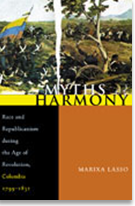 The Haitian Revolution and Popular Republicanism in Cartagena, Colombia
The Haitian Revolution and Popular Republicanism in Cartagena, Colombia
Marixa Lasso, Ph.D., is Associate Professor of History at Case Western Reserve University. She is the author of Myths of Harmony: Race and Republicanism during the Age of Revolution, Colombia, 1795-1831 (2007).
The city of Cartagena was the main port of colonial Colombia and one of the most important ports in the Spanish Caribbean. Like other Caribbean cities, its population was composed of a white minority and a majority of free and slave people of African descent. With the outbreak of the Haitian Revolution, Spanish authorities began to fear the emergence of Haitian-inspired rebellions, their fears were confirmed in 1799, when the city of Cartagena was shaken by a conspiracy of Haitian, African, and Creole Slaves to take over the city and kill all the whites. Although the alleged conspiracy did not go beyond the burning of a few nearby Haciendas, colonial authorities remained on the lookout for other conspiracies. With the declaration of independence and the establishment of the Republic of Cartagena in 1811, contacts with Haiti strengthened. French and Haitian sailors became a common sight in the city, when the government transformed Cartagena into a haven for Caribbean corsairs in 1812. Cartageneros and Haitians sometimes joined together as pirates, and Haitians served as sailors in the new Republic’s navy. Haitian sailors also participated in the defense of the Republic of Cartagena during the 1815 Spanish siege. Indeed, we know with certainty that a fifty-man garrison was formed exclusively with Haitians.
Haiti also became an element of the local political language, which was used to express the racial tensions of the independence period. Cartagena’s republican patriots were a multiracial coalition that included black and mulatto artisans and members of white elite. Like other Spanish American patriots, Cartagena’s patriots declared the legal equality of all free men regardless of color and promised a new era of republican equality, when differences between men would be based on merit, not color or birth. During the wars, a few free men of African descent rose to positions of military and political leadership, seemingly confirming the new ideals of racial equality. In this context, Haiti developed into a political image that tested republican race relations and showed the extent of social change that revolutionary warfare could bring. For white elites, Haiti represented a frightening extreme: that black patriots would use the political and military power they had acquired during the wars to expel the white elite and establish a black and mulatto ruling class. For blacks and mulattos, Haiti represented the possibility of continuing the revolution until the newly proclaimed republican equality was truly fulfilled and all forms of formal and informal discrimination ended. In the words of a mulatto carpenter, "if people of his rank are as ill-treated in the rest of Colombia, God forbid, a new war against the whites might start."